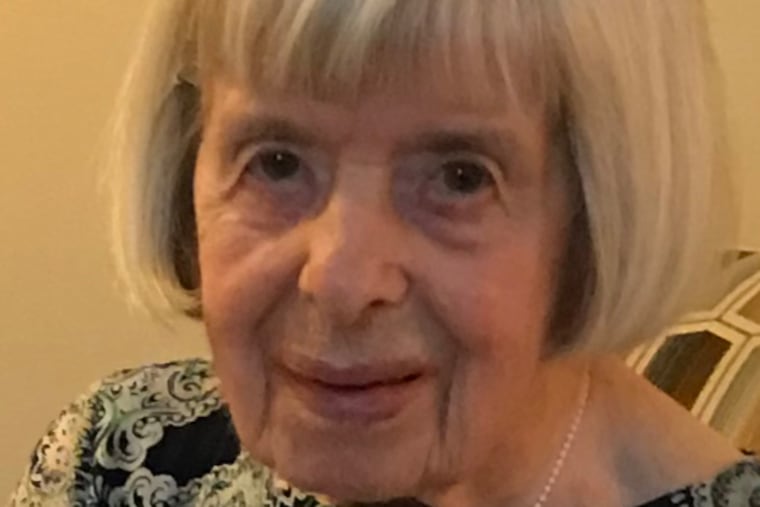Helen Oakes, 94, newsletter author who pushed to improve city schools
Mrs. Oakes believed in public education. She saw disparities, however, in funding for schools in rich and poor communities. That disparity launched her scrutiny of the city's public schools and the famous Oakes Newsletter.

Helen Oakes, 94, of Overbrook, an expert on Philadelphia’s public schools who through her probing monthly newsletter and seven-year service on the Board of Education pushed to make the schools better, died Tuesday, May 21, at the Hearth at Drexel in Bala Cynwyd.
“In the last half of the 20th century, there wasn’t a single citizen, officeholder or not, who cared more or did more for the Philadelphia public schools,” said former Mayor William J. Green III, who appointed her to the school board in 1982. “She seemed to be a very deserving candidate.”
From 1970 to 1989, Mrs. Oakes set herself the task of writing and publishing the Oakes Newsletter. Each issue of the monthly publication was devoted to one topic and expressed a point of view. Its aim, she wrote in her resumé, was to help restore to health the city school system, which was being roiled by teacher strikes and budget cuts.
“She wrote hundreds of newsletters and did it for decades,” Green said. “She was in a class by herself.”
Born in Rochester, N.Y., Mrs. Oakes graduated from the Harley School there. She graduated in 1945 with a bachelor’s degree in physics from Smith College. In 1960, she moved with husband Earle to Overbrook, where the couple had four children, all of whom graduated from Overbrook High School.
That same year, Mrs. Oakes began studying the Philadelphia schools. She was chair of the Education Committee of the League of Women Voters in 1965 and a member of the board of the watchdog Citizens Committee on Public Education from 1971 to 1980, and was on the Philadelphia School District’s task forces on desegregation and teacher selection.
She told the journal Education Week in March 1989 that the issues of greatest concern to her over the years were “the importance of developing a love of reading and a love of learning” and fostering “a school environment in which children understand that they are cared about as individuals.”
Rhonda Lauer, her friend and the former principal of the Andrew Jackson School at 12th and Federal Streets, said Mrs. Oakes’ belief in public education formed the keystone of her research and fueled her civic activism.
“What really drove her early on was the funding disparities she saw for schools between rich and poor communities,” Lauer said. “She studied them on her own because she was passionate about equality.
“She believed that the only way to lift kids out of poverty was education. That passion just drove her, and she also recognized the opportunity gap in some neighborhoods,” Lauer said.
When, as a board member, Mrs. Oakes scrutinized Lauer’s Jackson School in the 1980s, the process was sometimes painful.
“But she didn’t leave you hanging,” Lauer said. “She looked at your data. She helped you analyze it. She helped you use the data to drive instruction. She really forced you to take a truthful, honest look at your practices, whether you were a leader or teacher. She was always willing to help you make things better for all the kids.”
Because her stance was so critical, Mrs. Oakes made enemies. When her term on the school board expired in 1989, she had hoped to be reappointed by Mayor W. Wilson Goode Sr., but that didn’t happen. She accused school superintendent Constance E. Clayton of blocking her reappointment because of her outspokenness.
But Clayton was complimentary at Mrs. Oakes’ final board meeting. “We’ve learned from her in a variety of ways,” Clayton was quoted as saying in a December 1989 Inquirer story. “We’ve been appreciative of her candor, her hard, tough questions. We look forward to seeing her continue her interest in public education.”
In addition to her newsletter, Mrs. Oakes compiled and published a School-by-School Statistical Analysis of the city’s public schools from 1975 through 1981. The study included data on enrollment, average class size, absenteeism rates for staff and pupils, and reading test scores.
After leaving the school board, Mrs. Oakes served as an education consultant for foundations, businesses, or individuals interested in funding aspects of the public schools such as after-school programs.
Her contributions were recognized with the 1986 Chapel of Four Chaplains Humanitarian Award; the 1979 John N. Patterson Award from the Citizens Committee on Public Education; and the 1976 Philadelphia Association of School Administrators Award for perceptive reporting on education.
Her husband died in 2011. A son, David, died in 2016. She is survived by sons Dennis and Jeffrey; daughter Peggy Shorr; eight grandchildren; and two great-grandchildren.
Services were private.
In recognition of her advocacy, Mrs. Oakes’s family has created the Helen Oakes Literacy Institute. Its goal is to improve literacy rates by honing the skills of Philadelphia public-school teachers. The institute will be run by the nonprofit Foundations, Inc. Donations may be made via https://secure.qgiv.com/for/holi/.